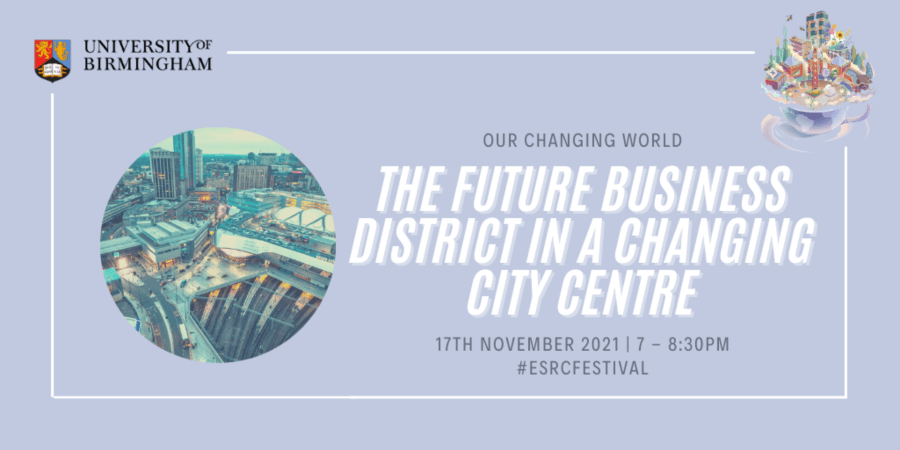 The onset of the coronavirus pandemic has forced us to change the ways in which we work, socialise, and move around. The profound impact the pandemic has had on city centres is clear. Yet, as we look to the future, this is less certain. So, what are the long-term trends in the future city centre after the pandemic, and where does that leave us?
The onset of the coronavirus pandemic has forced us to change the ways in which we work, socialise, and move around. The profound impact the pandemic has had on city centres is clear. Yet, as we look to the future, this is less certain. So, what are the long-term trends in the future city centre after the pandemic, and where does that leave us?
City-REDI/WMREDI from the University of Birmingham will be hosting a free, public event around what a Future Business District in a Changing City Centre could look like. The event is on Wednesday 17th November 19:00 – 20:30 and will discuss the findings of The Future Business District Report. The event is hosted at the newly opened Exchange, Centenary Square, Birmingham.
We are committed to engaging in a hybrid event with a live online stream alongside the in-person event. The event is to be livestreamed via the University of Birmingham Facebook page to encourage as many people as possible to engage in the findings of the research. To book your place and to find out more please follow this link.
The event will be a fantastic opportunity to engage in the research findings to discuss the big trends that are ongoing in the city centre. Discussions will revolve around the future of many interconnected issues in the city centre such as:
- Hybrid working
- Culture
- Transport
- Safety
- Inclusivity and well-being
An expert panel will provide insights into how they are working to address the topics above in their roles before opening up discussion with both online and in-person attendees. The panellists will be:
- Beth McArdle, Shoosmiths – Like many companies in professional services, Shoosmiths have had to adapt to a hybrid model of working part from home and part from the office. Beth can provide insights into what the hybrid mode of working means for Shoosmiths and their offices in Birmingham city centre.
- Salla Virman, West Midlands Combined Authority – The demand for social interaction has not waned despite the pandemic. Looking to the future, the cultural sector can provide opportunities to meet this demand. Salla can outline the prospects for cultural and creative organisations in future city centres.
- Alan Bain, Mott MacDonald – With a trend towards more hybrid working, the transport sector faces changes in travelling patterns whilst also playing a role in meeting carbon zero targets. Alan can provide an overview of the role of transport in future cities.
- Alicia Souter, Night Time Economy Solutions – The importance of safety in the city centre is one of the most critical topics right now. Alicia has worked across the country to implement safety schemes such as a Covid-19 Safety Accreditation to address issues of public health and public safety in hospitality venues.
Wrapped around all the above interconnected topics are issues regarding inclusivity, well-being, employment, climate change, housing, and footfall amongst others. Hannes Read from City-REDI/WMREDI at the University of Birmingham will present the findings of the Future Business District research to outline potential future scenarios. Discussion will with attendees and panellists revolve around the likely future trends, where we would like to be, and how we can get there.
The Future Business District in a Changing City Centre is being run alongside the Festival of Social Science throughout November 2021. A list of all 424 events from 34 academic institutions can be found here.
This blog was written by Hannes Read, Policy and Data Analyst, City-REDI / WMREDI, University of Birmingham and was first posted on the Birmingham Business School Blog.
Disclaimer:
The views expressed in this analysis post are those of the authors and not necessarily those of City-REDI or the University of Birmingham.
